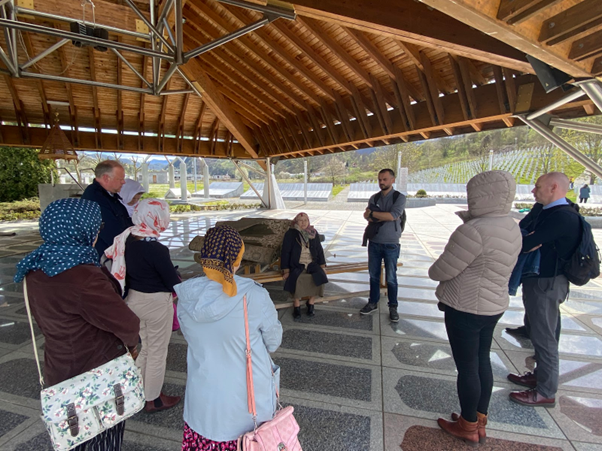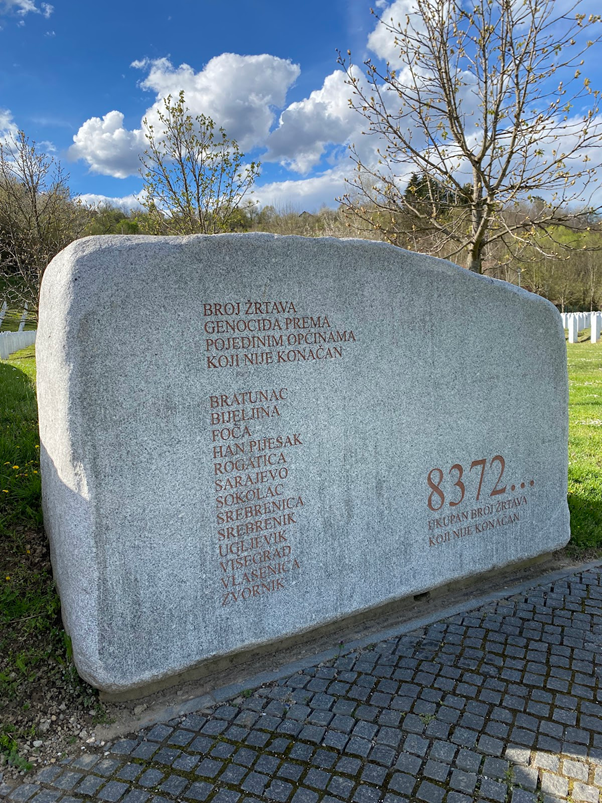‘Peace making and peacekeeping are the hardest concepts to teach’

On White Armband Day, Robin Macpherson, head of Robert Gordon’s College, discusses the importance of studying and memorialising events such as the 1990s genocide in Bosnia and Herzegovina.
We’re standing in the Genocide Memorial Centre at Potocari, Bosnia, listening to Almasa Salihovic explain why her brother Abdulah had two funerals. At the tender age of 18, he was one of over 8,000 men and boys murdered in the Srebrenica enclave in the summer of 1995, despite being under UN protection. Almasa was only six at the time. Each year, victims whose remains are discovered are buried together in a commemorative ceremony at Potocari on July 11th. When Almasa’s brother’s remains were first discovered, his head was missing. They buried what they had found, but when his skull was recovered his grave was reopened last year so it could be interred. This second funeral was attended just by Almasa’s close family. “It was even more painful the second time. The first time you are surrounded by others who share your pain. To go through it again, just with your close family, hurts even more.”
I’m a trustee of Remembering Srebrenica Scotland (RSS), a charity which shares the stories of victims and survivors of the Bosnian genocide so that we can challenge intolerance and prejudice in society. We are a sister organisation of Remembering Srebrenica. It has regional boards across the UK, all doing similar work, so that the atrocities committed are never forgotten, or airbrushed from history. Almasa is one of many survivors who are brave enough to tell their stories, and like so many she is young. When we think of genocide survivors we can’t help but think they are elderly, because we equate genocide with the Holocaust. Yet Bosnia, like Rwanda, Darfur and many other places, has a recent history of ethnic cleansing.
When we talk about the ‘ten stages of genocide’ we make the point that all societies are vulnerable to that process. The first step is separating people into categories for classification - creating ‘us’ and ‘others’. Stage 9 is committing genocide, and stage 10 is denying that anything ever happened. Denial is a huge problem and one that we come up against frequently, because strenuous efforts were made to hide war crimes in Bosnia. Abdulah Salihovic was dumped in a mass grave, which was then dug up and bodies moved by industrial equipment to secondary and even tertiary mass graves nearer conflict sites so they could be passed off as combat deaths. This was captured on satellite photography and an abundance of evidence presented to the International Criminal Tribunal at the Hague, which to date has indicted 161 individuals and convicted 91 - totals which seem depressingly low considering how many people were involved.
The visit I have just been on was with a delegation of fellow teachers in Scotland, so that they can help the education work that RSS focuses on. Other Remembering Srebrenica boards across the UK run delegations, and if you are interested in getting involved I strongly recommend getting in touch. Each of the regional boards has active social media channels so that part is easy. A network of volunteers is very willing to work with schools, colleges and universities to help share learning. I’ve run school conferences many times, and we hold events to mark Holocaust Memorial Day (January 27th), White Armband Day (May 31st) and Srebrenica Memorial Day (July 11th). White Armband Day is commemorated in Scotland to mark the events in Prijedor in 1992 when Muslims were made to wear white armbands, in scenes terrifyingly reminiscent of the yellow Star of David emblems during the Holocaust.
What we do at RSS is a reminder of two well-known quotations. Thomas Jefferson reminds us that “the price of freedom is eternal vigilance”. The idea that teaching about diversity, equity and inclusion are part of a ‘woke agenda’ is anathema to me. Division and intolerance are serious threats to civil society, and further study of Bosnia pre-1992 shows that divisions there were no more stark than you will find in other parts of the world. Just think of Scotland’s history of sectarianism that still plays out with Orange Order marches on July 12th, or in singing at Rangers and Celtic matches. Secondly, Edmund Burke’s famous aphorism that “all it takes for evil to prosper is for good people to do nothing” is one I frequently use in assemblies. The international community sat by and watched while Srebrenica burned, even though Dutch UN soldiers were on the ground bearing witness to these awful events.
As we leave the cemetery at Potocari we are thinking of the words of Fadila Efendić, one of the Mothers of Srebrenica, who lost her husband and son in the genocide. She tells us: “Thank you to everyone who writes about Srebrenica, who puts it down on paper, because this way it will be remembered.” Teaching young people how not to be passive bystanders is one of the hardest things we try to do as educators, but do it we must. Since Bosnia and Rwanda we have had the Rohingya and the Uyghurs. Make sure your pupils know who these people are, and what happened to them.
As part of the curriculum we are very good at teaching how wars start, and what impact they have. What I would love to see going forward is more emphasis in the curriculum on conflict prevention, peace making and peacekeeping. Those, in my experience in a history classroom over the past two decades, are the hardest concepts to teach.

Almasa Salihovic, who now works as a guide at the Srebrenica Genocide Memorial Centre in Potocari.

Almasa’s brother Adbulah (the second last name on this document) was on a list of names taken by Dutch UN soldiers in the hope he would be spared. It made no difference.

(above) Our group of teachers listening to Fadila Efendić, one of the Mothers of Srebrenica.
(right) The memorial stone at the cemetery at Potocari, where bodies continue to be buried each year as more graves are uncovered.

